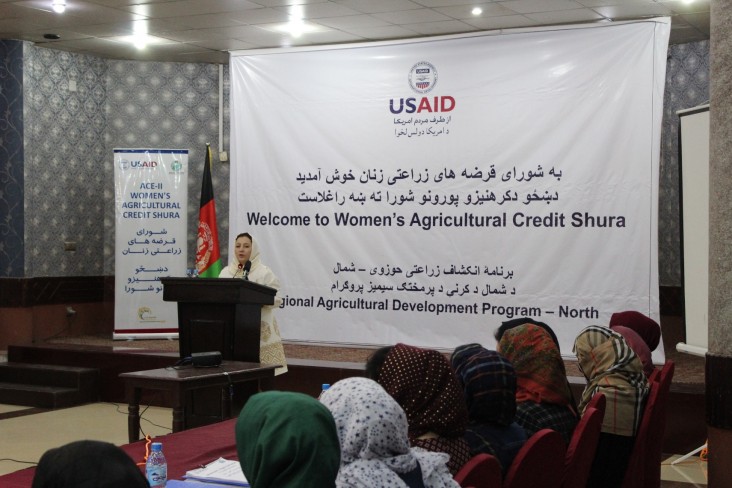
For Immediate Release
Balkh, Afghanistan – When it comes to accessing credit for women farmers and women-owned agriculture-related businesses, challenges have often forced these operations to close because of a lack of understanding how credit works. The United States Agency for International Development (USAID) wants to change that and help these women prosper in their businesses.
With that in mind, USAID’s Regional Agricultural Development Program-North (RADP-N), in partnership with Agricultural Credit Enhancement Phase-II project (ACE-II), hosted the Women’s Agricultural Credit Shura in Mazar-e-Sharif on Wednesday to increase knowledge of the opportunities for women to secure agricultural credit. This event focused on practical training for women to apply for and manage credit. This event brought together a number of top microfinance institutions in Afghanistan along with other financial experts to work with Shura attendees.
Topics included women’s economic rights, the types of credit available – traditional and Islamic, and how credit could help them grow their business or farm. The participants also worked in group activities which included discussions about challenges women face in accessing credit and were able to discuss those challenges with women who have had experience with taking loans.
“This is a critical program in giving women the financial means to provide for their families, but also gain the educational skills to understand how credit works and why it’s crucial to their success,” said USAID Mission Director Herbie Smith. “We will continue to support women entrepreneurs in agriculture and provide them with the tools to improve their lives.”
USAID’s RADP-N is a five-year program focusing on wheat, high-value crops such as grapes and melons, and livestock. It helps producers, associations, traders, and agribusinesses to respond to market demand and help create market links between farmers and small, medium, and large businesses that allow the private sector to improve and grow.
The USAID Agricultural Credit Enhancement (ACE) project established and managed the Agricultural Development Fund (ADF) until it was transferred to the Afghan government in 2015. The follow-on project, ACE-II, seeks to build on results achieved by the previous program and expand access to agriculture-related credit to increase commercial viability of small and medium-size farms and agribusinesses as a necessary condition for a thriving agricultural economy.
With almost $17 billion spent on development programs in Afghanistan since 2002, USAID provides the largest bilateral civilian assistance program to Afghanistan. USAID partners with the government and people of Afghanistan to ensure economic growth led by the country’s private sector, to establish a democratic and capable state governed by the rule of law, and to provide basic health and education services for all Afghans.







Comment
Make a general inquiry or suggest an improvement.